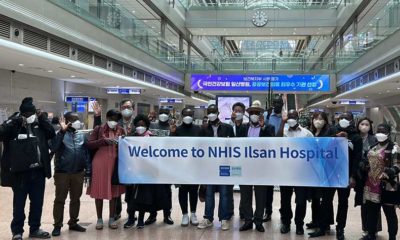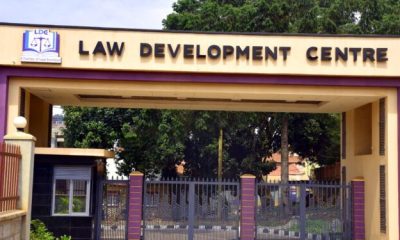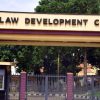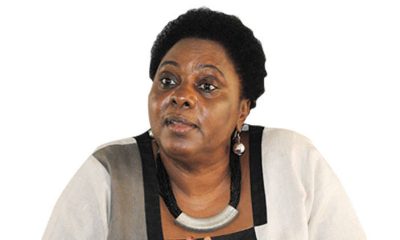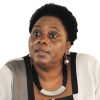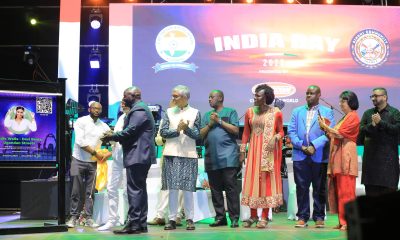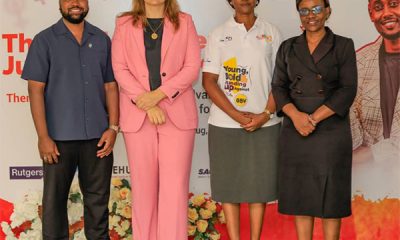News
Korea and Uganda vow to deepen economic ties at commemoration of 60 years of cooperation
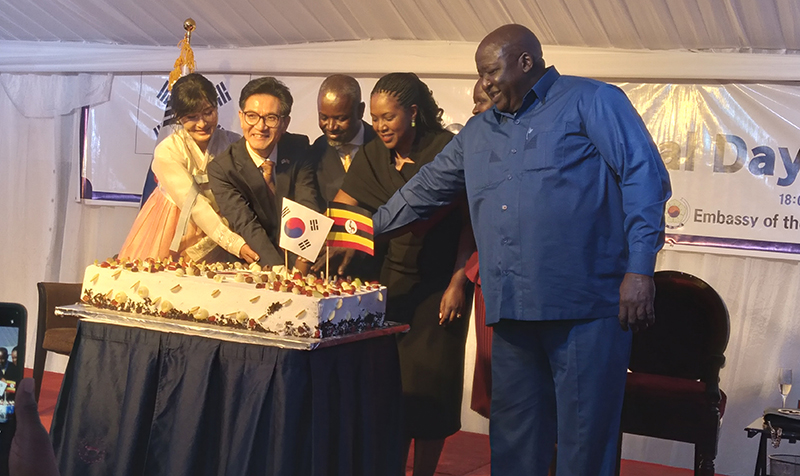
Ambassador Park and his wife was joined by Deputy Speaker Tayebwa and his Wife as well as State Minister for International Cooperation Henry Okello Oryem to cut the cake to symbolize celebration 60 years of Korea-Uganda ties at Sheraton Hotel, Kampala on October 3, 2023
On Tuesday October 3 2023, the Embassy of the Republic of Korea in Uganda rolled out a red carpet to welcome the Deputy Speaker of Parliament Thomas Tayebwa and several other noted guests and friends of Korea in Uganda to commemorate a special occasion.
It was the celebration of the country’s 4333th National Foundation and Armed Forces Day and also the climax of the year-long celebrations to mark 60 years of diplomatic relations between the Asian economic giant and Uganda.
The mood that surrounded the ambient Sheraton gardens on a cool Tuesday evening was one of festivity and merry-making characterized by popping of Champaign, a sumptuous dinner and donation of gifts from the Korea International Cooperation Agency (KOICA) for their guests.

Guests enjoyed lots of food and drinks at the fete
The presence of the Deputy Speaker of Parliament Thomas Tayebwa, Uganda’s Number 5 in the order of precedence and protocol, as the chief guest for the special celebrations, emphasized the importance of this year’s celebrations.
In his speech, Ambassador Park Sung-soo of the Republic of Korea in Uganda, noted that although both countries were celebrating 60 years of cooperation, he was unhappy with the low level of economic cooperation between both countries.
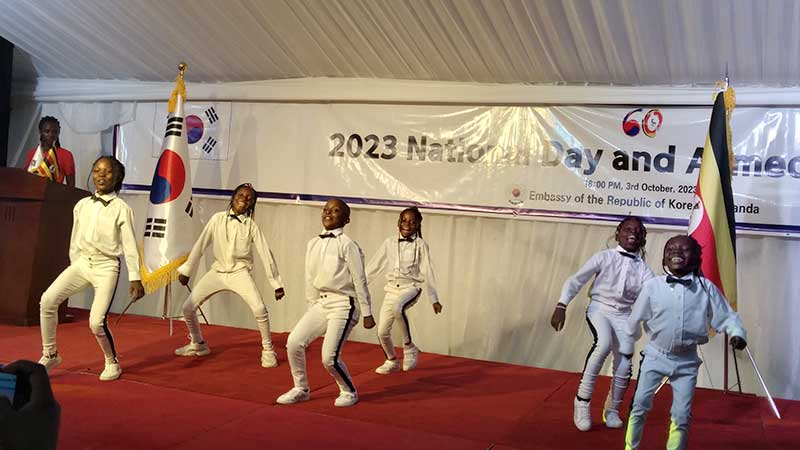
Ugandan kids entertained the guests by performing Korean Hip Hop aka K-pop music
Ambassador Park said: “Looking back over the past 60 years, I think our two countries have managed to maintain good relations. There were mutual visits of both presidents in 2013 and 2016 respectively. We have had moderate trade and investment relations and relatively big-sized development cooperation in place.”
He added: “However, to be honest with you, I am not satisfied with what we have done for the last 60 years. There was so much room for improvement, cooperation and collaboration waiting to be realized. We should have done more.”
He cited the low volume of trade between the two countries – currently estimated at below US$50 million, dwarfed by that between Uganda and India for example – which is estimated at close to US$2 billion, as a low point in the diplomatic ties.
Although Ambassador Park avoided going into the reasons for this abysmal trade, one could attribute it to the political turbulence in Uganda during the 1970s and 80s and the adoption of an inward development strategy by the Asian country that led to a restructuring of its foreign services and led to the downgrading of its embassy in Kampala to a consulate in 1994.
These developments gave little chance for both countries to trade hence the low level of economic ties.
But since 2011 when Korea re-opened its embassy in Uganda, the Asian economic giant has made significant strides in reviving the stalled ties.
Since returning to Uganda, Korea has made inroads into softening the ground for robust economic co-operation by making significant aid donations. This has targeted different sections of Uganda’s economy such as the health sector, roads and airport infrastructure development, technical education, agriculture and rural development.
Ambassador Park noted that his country’s new economic strategy has put Africa at a higher level by pledging to more than double official development assistance in the next ten years.
Beyond aid, ambassador Park called for a more long-term sustainable and mutually beneficial economic relationship -one that is underlined by more trade and less aid.
He said: “It means we have to shift our focus from unilateral development relations to two-way economic relations such as trade and investment adding value to each other’s products and material.”
Although Korea dwarfs Uganda in all aspects of economic development and would dominate the East African country in a free-trade arena, there is reason to believe that Uganda would benefit from carefully calibrated trade ties with the Asian giant.
Uganda’s trade and investment promoters could take advantage of the forthcoming Korea-Africa Summit to be hosted by President Yoon Suk Yeol of South Korea in June 2024, to vigorously market the country as the most conducive investment destination for Korean businesses in Africa.
Deputy Speaker Tayebwa heaped praise on Korea for its development assistance made to Uganda over the last decade. He confirmed that President Yoweri Museveni will attend next year’s Korea-Africa summit to further make the case for investment in Uganda by Korean companies.
Tayebwa pleaded with Korea to help Uganda cope with its refugee crisis, saying other developed countries have shifted focus on responding to the refugee situation in Ukraine and reduced support for refugees in Africa. Uganda has the highest number of refugees on the continent, estimated at more than 1.4m.
Comments



